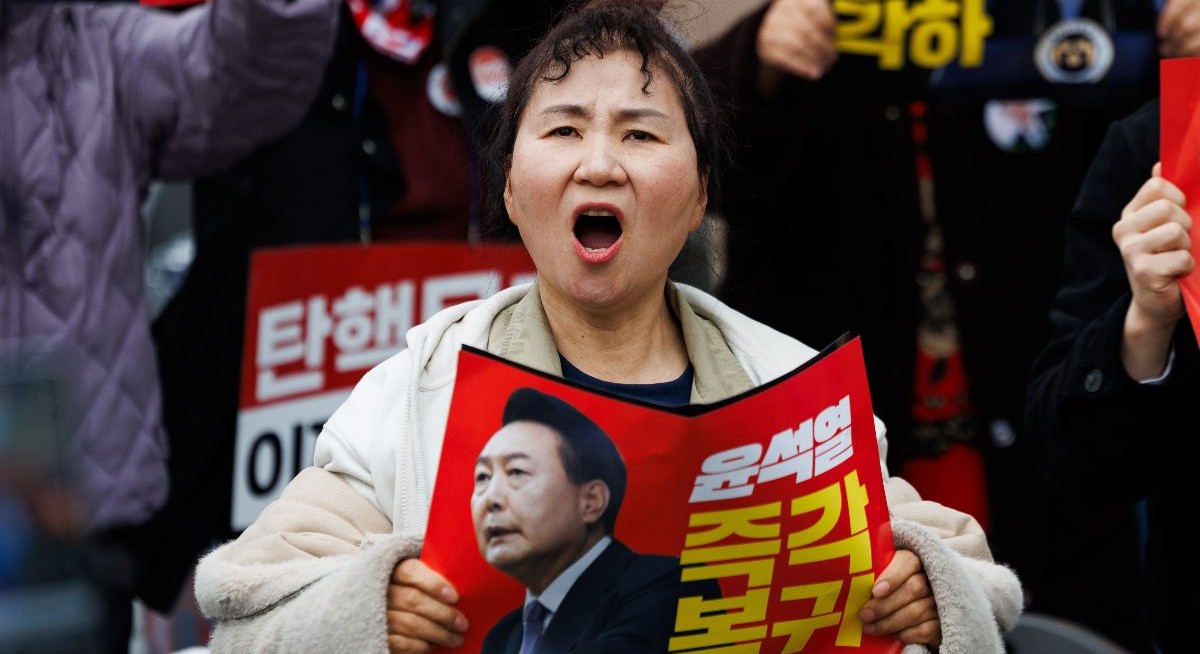"It's been a huge honour to be able to work for the Republic of Korea," Yoon said in a statement after the verdict. "I feel so regretful and sorry for failing to meet your expectations."
The court's decision marks a potential conclusion to one of the most turbulent political chapters in South Korea's recent history. The next leader will be tasked with handling a slew of challenges, including contending with Donald Trump's escalated global tariff campaign and dealing with a more emboldened North Korea.
"We see this as a near-term positive on domestic economic sentiment as the prolonged political uncertainty has been removed," said Kathleen Oh, an economist at Morgan Stanley Asia Limited. "We expect a return of policy uncertainty during the election period but note that the worst likely has passed."
Prime Minister Han Duck-soo, currently acting President, pledged to maintain a firm security stance and ensure there's no disruption in responding to pressing issues such as the trade war. "We will do our best to manage the next presidential election so that the next government can be launched without a hitch," Han said.
See also: Russia and Ukraine envoys set for new US-led talks in Geneva
South Korea's main equity benchmark Kospi gave up all its gains leading up to the impeachment ruling and was down 1.8% as of 1.20pm local time. Shares of Korean retailers, tourism and entertainment firms rose as the court order to impeach Yoon raised hopes for a revival in domestic consumption. The won fluctuated against the dollar on the decision but remained higher amid broad weakness in the US currency.
In December, Yoon declared martial law, the first such order in South Korea in over 40 years. He withdrew the decree hours later after lawmakers voted it down, and within days, parliament impeached him, leading to his suspension from duties.
Yoon's political gamble plunged South Korea into its worst constitutional crisis in decades, leaving the export-reliant nation without clear policy direction as Trump escalated his tariff campaign.
See also: Trump privately weighed quitting trade pact he signed with Canada, Mexico — Bloomberg
"His unconstitutional and illegal acts are tantamount to betraying the trust of the people and constitute serious violations of the law that cannot be tolerated from the perspective of defending the Constitution," Moon Hyung-bae, the acting chief of the Constitutional Court, said.
Yoon has denied any wrongdoing and said the martial law decree was aimed at stopping the main opposition Democratic Party from paralyzing his administration. He now faces pending results of his criminal trial over the martial law decree, a process that has been ongoing independently of the Constitutional Court case.
Opposition leader Lee narrowly lost to Yoon in the 2022 presidential election. A landslide win for the Democratic Party in the April parliamentary elections gave him a strong tailwind for another run for the presidency.
"Our people have dramatically revived democracy in this land," Lee said shortly after the verdict. "If we join forces, we can quickly restore the trust of the international community and turn the crisis into an opportunity."
Under Lee, the Democratic Party has been looking to increase taxes on wealthy individuals and the chaebol conglomerates that dominate the country's corporate landscape. He touts a more conciliatory approach to relations with North Korea, which might align with Trump if the US leader seeks to revive diplomacy with North Korean leader Kim Jong Un.
Lee is more cautious about taking a hard line on China and pursuing closer relations with Japan, which could make coordination among the US and its regional allies more challenging.
To stay ahead of Singapore and the region’s corporate and economic trends, click here for Latest Section
What Bloomberg Economics says...
Other potential candidates to succeed Yoon include Kim Moon-soo, a labor minister in Yoon's cabinet, and Oh Se-hoon, the mayor of Seoul.
"It is regrettable, but the People Power Party takes the decision of the Constitutional Court seriously and humbly accepts it," said Yoon's party leader Kwon Young-se, shortly after the verdict. "We firmly believe that respecting this decision is the way to protect democracy and the rule of law," Kwon said.
Whoever wins the presidential election, they will be inheriting an economy that faces multiple risks ahead. Trump's unprecedented decision to slap tariffs across the world hit South Korea harder than most, especially among the US's security allies.
The White House is set to impose 25% tariffs on South Korea across the board from April 9, and has already implemented high levies on cars, steel and aluminum. Trump's escalated tariffs and plans to bring more production back to the US pose a risk to a range of South Korean companies deeply embedded in global supply chains, including Samsung Electronics Co., and automakers such as Hyundai Motor Co.
Yoon's martial law decree has also battered consumer confidence in South Korea. The central bank has been downgrading its economic forecasts for this year to account for the likely hits to growth, while also cutting its benchmark interest rate to try and shore up the economy.
The moment Yoon's ruling was delivered, anti-Yoon demonstrators burst into cheers in a celebratory mood. But the verdict has left some disappointed. "The rule of law has completely collapsed, and today will be remembered as the day communism took over South Korea," said 36-year-old Stella Jung, a Yoon supporter.




